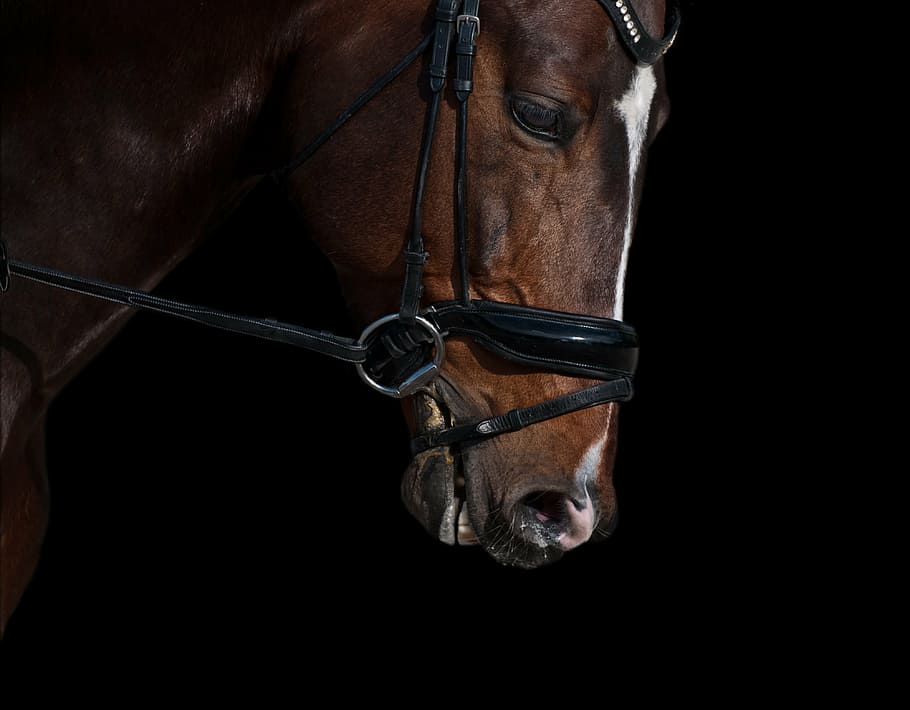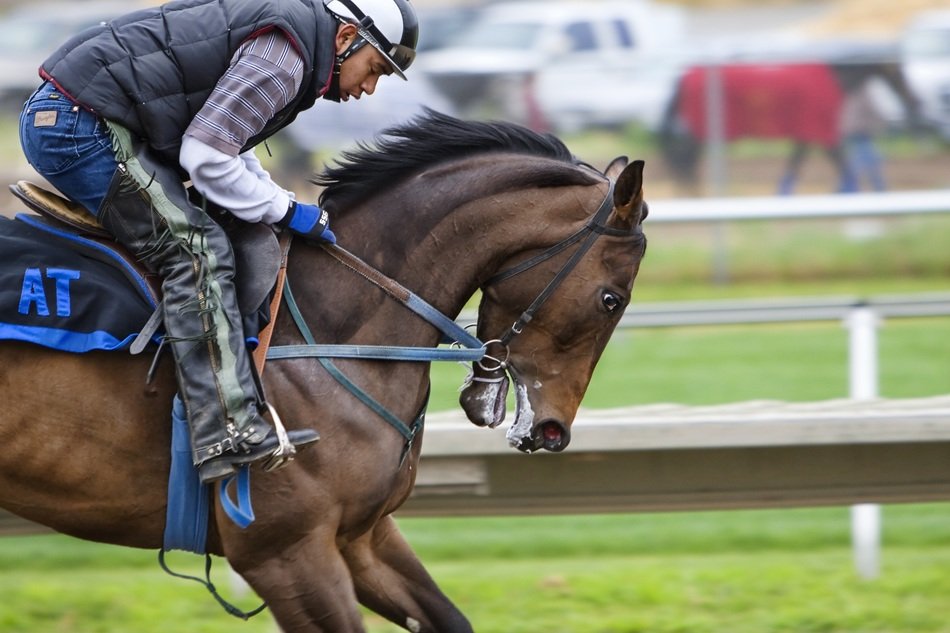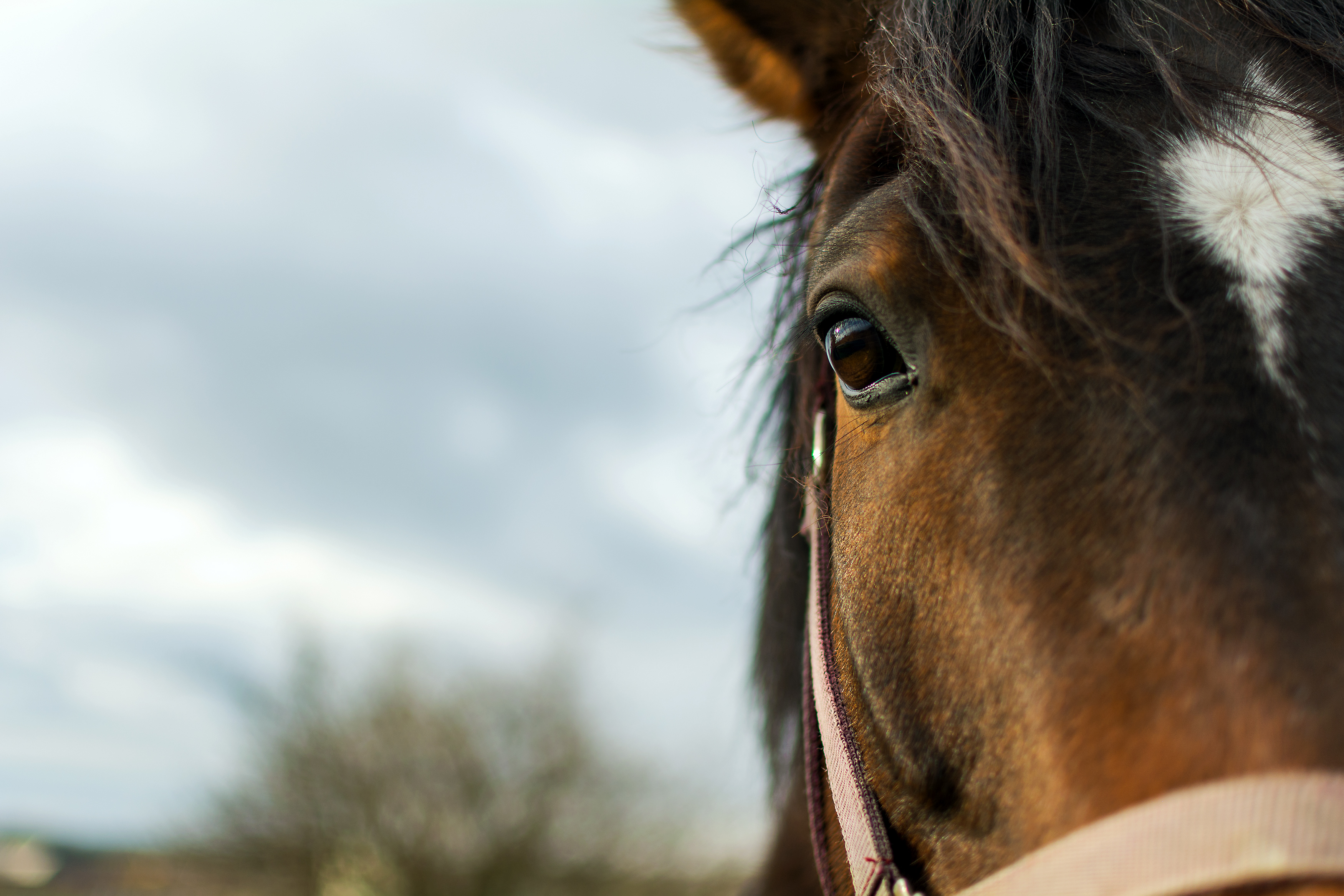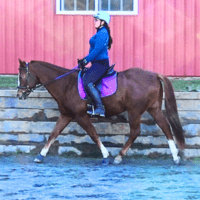Does your horse open their mouth while being ridden, chomp on the bit or grit there teeth? Are you trying to figure out why your horse is doing this behavior.
Maybe your worried that the horse doesn’t like their bit, there are possible dental issues or you need a different noseband.
I wondered the same things when my horse Chip (lease horse) started chomping at the bit when I would ride him, even with a loose rein.
Have people then told you not to worry about your horse’s mouth, just ignore it and ride? Or your horse just need to get used to the bit? Or you need to tighten the noseband and use a flash?
Don’t listen to those people. Don’t ignore your horse or try to silence them.
A horse that opens their mouth when ridden does so, because they are reacting to discomfort or in pain. This can be caused by dental issues, harsh hands, an ill fitting bit, or something else bothering the horse.
Maybe it is obvious to some of you that a horse opening their mouth while being ridden is uncomfortable.
But for others, maybe you never really considered what it was really all about and always thought it was just quirky or a bad habit the horse has, such as cribbing or other vices.
Other behaviors similar to the open mouth behavior under saddle that can also have similar causes:
- Chomping at the bit
- Sticking tongue out
- Gritting teeth
If you want a good working relationship with your horse. It needs to be built off trust. If your horse feels discomfort when you ride them, it will be difficult to develop that trust.
You are taking the first steps to solving this problem by finding out the potential causes for why your horse is opening their mouth.
Well done for caring about your horse enough to learn more about what is going on, unfortunately not everyone does that.
Disclaimer: If you are having a problem with your horse make sure you have your vet help evaluate what is going on. Even a phone call to the vet can sometimes help. They have extensive knowledge and experience. I’m just an equestrian sharing what I have learned and experienced with horses in my own life and not sharing this as professional advice.
What It Means When Your Horse Opens Their Mouth Under Saddle And Why They Do It

How would you like to work out at the gym in sneakers that are too small with your toes all scrunched or sneakers that are too big causing your foot to slide around creating blisters.
You probably would grimace, frown, maybe say “ouch” when you feel pain or at least have some kind of expression at the discomfort.
Like I mentioned before when a horse opens its mouth, it is because there is a problem. Something is bothering the horse. And it is not always the obvious choice causing the discomfort.
Most people would go to the bit as the source of the problem. Sometimes it is the bit, but not always.
When a horse opens their mouth they are reacting to the pain or tension. This is a type of evasion, the horse is trying to evade the pressure. The pressure being the discomfort or pain.
But discomfort can be expressed in other ways as well, such as:
- tail swishing
- kicking out
- pinning ears
- cocking their head to the side
- uneven gaits
- not traveling straight
- and many other ways
Another thing just to note is that sometimes a horse who has experienced pain that would react by opening and closing their mouth under saddle may potentially continue to do so even after the pain has been taken away.
‘It’s possible that it can become a habit. Often the horse may be anticipating pain and have some level of anxiousness causing the reaction of opening the mouth.
But you shouldn’t come to that conclusion until you have fully investigated all angles of what may be causing the behavior.
You care about your horse, want the best for them and your horse needs you to be looking out for their best interest, because if not you then who?
Why You Shouldn’t Just Ignore It and Keep Riding

There are equestrians who see a horse opening their mouth just at face value and don’t go any deeper into the problem.
They think it is normal for some horses and you just need to ride them forward, get a steady rhythm, and ignore it because the horse is just quirky.
Then there are equestrians that think because they tried a bunch of different bits, ride on a loose rein, had the vet check the horse’s mouth which was deemed fine, that it must just be a behavioral issue.
So they tighten the noseband a little, add a flash, to try to minimize the problem, and hope that the horse will settle and eventually quiet their mouth.
But are there other factors that could be affecting this horse to produce this behavior? Yes quite a few actually that you wouldn’t have immediately thought of.
Why Tightening The Noseband And Using A Flash Doesn’t Help

There are not one but a few problems with a tight noseband and flash.
Crank nosebands can cause even worse abuse to the horse because it allows you to tighten the noseband to a further degree than the typical noseband.
Though not everyone who uses a crank noseband abuses it nor a bridle with a flash.
Before I go on I just want to say that nosebands aren’t inherently bad neither are all bits (some bits are evil though).
Drop nosebands, bridles with flashes and bridles like the Micklem bridle can help to stabilize the bit in the horse’s mouth.
But they can also be used harshly if put on too tightly.
Problems with a tight noseband and flash:
- If the noseband is placed too low and tight it can restrict the horse’s airway and make it difficult for the horse to breathe.
- Using a flash to keep the horse’s mouth closed is a band aid to the problem and doesn’t fix the underlying source causing the horse’s behavior.
- A tight noseband can cause damage to the horse’s cartilage above their nose. (This is also true with hackamores and certain bit-less bridles that are used with rough hands.)
- When you tighten a noseband it presses the horse’s cheek against their teeth. The horse can sometimes bite the inside of their cheek and if they have any hooks, sharp or rough edges on their teeth the rubbing on the cheek will be exacerbated by the tight noseband.
- Horses salivate with a bit in their mouth and they need to be able to move their jaw and lift their tongue to the roof of their mouth to swallow. It is difficult for a horse to do this with a tight noseband.
- Imagine having your mouth cranked shut and teeth clamped. It would cause tension in your jaw. That is what is happening to the horse with a very tight noseband.
- Horses lick and chew when they are focusing, learning, and accepting something and this is hindered by having their mouth clamped shut.
- The horse will have trouble relaxing their jaw.
Wearing a tight noseband is plain uncomfortable for the horse. You can see it in their face.
Not every horse will have the exact same expressions of discomfort but there are some signs to look for.
Common facial expressions for horse discomfort
- Tension around eyes, whites of the eyes may show in the inner corner and eye bone may seem more prominent.
- Chewing muscles are obvious
- Dilated nostrils giving a flatter profile
- Upper lip slightly drawn back
- Chin may seem a little pointer
Check out this YouTube video about 24 behaviors indicating pain in riding horses.
List Of Problems That Can Cause Open Mouth Under Saddle
I have a legnthy list here of potential causes that can make a horse want to, or react by opening their mouth while being ridden.
So let’s go over the different areas of discomfort that can cause a horse to open its mouth, with the most common reasons first.
In this section I am just going to go over the potential reasons for open mouth or chomping under saddle and explain a bit about each of them.
In my next blog post I will guide you to finding out which problem your horse is experiencing, as well as give solutions for each of the different problems.
Potential Reasons Of Discomfort Causing Horse To Open Mouth Under Saddle:
- The way the rider uses the reins
- Bit does not fit properly
- Bit is not placed in the right spot
- There are dental issues
- The noseband is uncomfortable to the horse
- TMJ discomfort
- Saddle fit is not right
- Saddle is not placed in the right spot
- The horse feels pain somewhere
- Tension or Anxiety
The Way The Rider Uses The Reins

This is the most common reason for horses to open their mouth while they are ridden.
Each horse has a different level of sensitivity in its mouth. Some horses have mouth or tongue injuries that can be exacerbated from the bit.
Bits also have different levels of severity with how much pressure they apply and the areas on the mouth the pressure is applied. A more severe bit needs less pressure on the reins from the rider than a bit that feels milder to a horse.
A rider with hands that are busy can cause the bit to move around in the horse’s mouth constantly, this can cause rubbing on the corners of the horse’s lips. This can upset a horse with a sensitive mouth that wants the bit to be much more stable in their mouth with smooth controlled movements.
A rider that gets angry and uses the reins harshly will cause the horse pain, possible cuts in the horse’s mouth. The horse may become nervous or anticipate pain from the bit.
A rider that gets unbalanced and uses the reins to feel more secure or catches themselves with the reins when they lose their balance will also cause discomfort in the horse’s mouth. This will cause the horse to anticipate pain as well.
A rider who is working on contact with the horse but the contact is not consistent. The reins go back and forth from taut and slack. The horse may be getting bumped in the mouth. The inconsistent contact will have even more effect on a horse with a sensitive mouth that wants the bit to be more stable in their mouth.
A rider with heavy hands will cause discomfort to the horse. The horse may try to evade the rider’s contact with the open mouth as well as coming above the bit or behind the bit. The horse may also attempt leaning into the riders hands and becoming heavy, because of sore mouth. I read in The Horse a good analogy. A baby with sore gums that is teething will bite into things to try to relieve the pain, just like a horse feeling pain in their mouth may lean on the bit.
A rider that see-saws or pulls and releases with the reins to try to get the horse on the bit. This is uncomfortable for the horse. And the tension and pain the horse feels can lead to chomping or open mouth.
Check out this video on YouTube about the effects of the bit on the horse’s mouth.
Bit Does Not Fit Properly
There is more to fitting a bit than finding the right width.
Of course the width of the bit is one component you do need to determine when finding a bit that works for your horse. If the bit is too wide it will be sliding around too much in the horses mouth. If the bit is too narrow for the horse it will pinch the sides of the horses lips.
It is true that a thicker bit is milder in the sense that the pressure is more spread out than a thin bit. However depending on the roof of the horse’s mouth called the pallet, it can be uncomfortable for the horse.
if it is too thick and will make it difficult for the horse to move their tongue around to swallow. If the bit is too thick it will make it difficult for the horse to get release of pressure.
Bits have different shapes.
A horse that has a low pallet with a single jointed bit will be uncomfortable because when pressure is applied to the bit the joint could be hitting the roof of your horse’s mouth.
A horse that has a sensitive mouth wearing a french link or double jointed bit may not like the feeling of this kind of bit because it moves around more. Some horses like a more stable still mouthpiece.
Bit Is Not Correctly Adjusted
You might have a bit that is suitable for your horse but that doesn’t help too much if the bit is not properly adjusted for the horse on the bridle.
If the bit is too tight and up too high it will not only be uncomfortable for the horse’s lips that are being stretched but it can also interfere with the horses molars.
If the bit is too low it may clank against the horses front teeth or canines if they have them. The bit hitting the horses teeth will most definitely cause a horse to react and open their mouth.
Dental Issues

It should be a no brainer that if the horse has dental issues they will be uncomfortable whether from:
- inflammation,
- sore gums,
- cuts on the cheeks from sharp teeth,
- balled up wads of hay stuck behind teeth
- or something similar
Because if their mouth is uncomfortable it is very likely they’ll be opening their mouth, chomping, or seeming unhappy with the bit.
Remember if horses have sharp edges or hooks on their teeth and are wearing a tight noseband it will make the horse’s cheek rub against the sharp tooth and cause ulcers or cuts on the cheek.
Other potential dental problems could be a rotting tooth, tumor, something lodged in the horse’s mouth.
Uncomfortable With Noseband

Aside from the noseband being too tight. Some horses don’t like the feeling of certain nosebands.
Some horses prefer one noseband over the other even if they are correctly adjusted. It could be the horse has more sensitive areas on their face and some nosebands irritate the area while other nosebands don’t.
TMJ Discomfort

The TMJ joint a.k.a temporomandibular joint connects the horse’s lower and upper jaw. If this joint is bothering the horse it can be difficult and uncomfortable for the horse to move their jaw. This can produce resistance in the horse, such as sticking their tongue out, chomping the bit or opening mouth. These are just a few symptoms of the many symptoms horses with TMJ can have.
Saddle Is Bothering Horse
Saddle Doesn’t Fit Horse Correctly
The saddle must fit the horse properly to prevent soreness or injury.
An incorrectly fitting saddle can be a major source of discomfort for a horse. Opening their mouth under saddle or chomping the bit can be a sign the horse is feeling pain from the saddle.
Saddle Is Not Correctly Placed On The Horses Back
Even if the saddle fits correctly, you can still cause the horse discomfort and body soreness if the saddle is not placed in the right spot.
Too far forward the saddle will interfere with the horse’s shoulder and movement. The shoulder will be rubbing underneath the saddle or possibly bumping into the saddle.
Too far back the saddle which would be past the last rib, where the kidneys and other soft tissue are will cause soreness often in the loins of the horse.
Horse feels pain somewhere

So you know if the horse is feeling pain in their mouth whether from the bit, a rider’s hands, dental issues, an ill fitting saddle, these are all things that can cause a horse to react by opening their mouth or chomping on the bit.
But they are not the only areas of pain that will cause this. It can be due from pain anywhere in the body.
- A sore neck or poll
- ulcers in the digestive system
- lameness
- tight muscles
- or other sources of pain
Anything that is causing the horse discomfort can manifest through the horse fidgeting with their mouth.
Tension or Anxiety

Tension and anxiety are a little different from the previously mentioned potential reasons for the opening mouth behavior. Think of how you might fidget or act if you feel nervous, anxious or tense.
This is different because it’s mental, how the horse is feeling in their mind and it is manifesting as the physical symptom of opening the mouth, chomping, gritting teeth, etc.
- The horse may be anticipating something.
- The horse might get tense with new exercises or new experiences.
- The horse may be worried about being away from their buddies.
- The horse may be expecting pain.
- The horse is not used to the contact with the reins and is tense
These are just a few examples of why the horse may be nervous, anxious or tense. It may be something else that causes your horse to feel that way.
Quick Points About Why Your Horse Opens Mouth Under Saddle:
- Be patient with your horse. This behavior of opening their mouth under saddle is not because they are being bad or quirky but because they are reacting to the discomfort they feel.
- Don’t give up finding the root of the problem your horse is counting on you. If you’ve had teeth checked, tried different bits and nosebands, there is still something else bothering your horse. Your horse is relying on you.
- Now that you know the different potential causes of this behavior. It’s time to figure out your horse’s root cause. Read my next blog post to help you figure out the root cause and find a solution for it.
Next Blog Post To Read:
What To Do If Your Horse Constantly Opens Their Mouth With A Bit!
Hope this helped you gain a better understanding on why your horse opens their mouth under saddle.
Keep up the good work and seeking the best for your horse.
Cheers, Kacey

